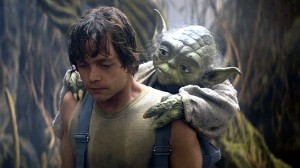When the trailer for the new Star Wars movie came out, my eldest son was appalled that I waited two weeks to see it. Lucky for me, waiting allowed time for parodies to be created, and for my son to sit with me to share a few guffaws based on our common adoration of that galaxy far, far away.
Since my own childhood, Star Wars has had a way of influencing parent-child relationships. My personal love affair with Star Wars began when I was 11, as I took the stage, playing a dashing and devilish Darth Vader in what is now an immortal classic, A Star Wars Chanukah. It was a fitting part to play, since I was dealing with my own dark side as I sorted through the emotions of my parents’ break up.
My devotion to Lucas’ space mythology took a deeper turn when I saw The Empire Strikes Back. In the throes of adolescence, I had far less time with my father than I wanted. While I didn’t exactly have the paternal issues of Luke Skywalker – my dad was more prone to shaking my hand as opposed to lasering it off – I did feel a Force-like bond to a diminutive green man with a voice like Sesame Street’s Grover. For me, Yoda was the father figure I wanted, the kind of person to teach, challenge, and guide me to live well.
For a kid who lived in his head most of the time, nothing offered clarity better than the line: “Do. Or do not. There is no try.” So, I tried, with disappointing results.
At age 14, I was a middling student, a benchwarmer for the JV basketball team, a debater who approached each tournament with gremlins fighting in my stomach, and a romantic who had so little confidence in talking to girls that I wrote out scripts before I called anyone:
“Hello, Debbie, this is (rustling papers) Gregg Keer.” – “How are you?” – “You don’t remember me?” — “We (voice cracking) danced to “Freak Out?”
Yes, I certainly felt like a freak – and a geek – and I desperately wanted a Yoda. I talked to educators, a couple of whom were patient and wise guides like my English teacher Mr. West and my Western Civ instructor, Dr. Kleinz. I read magazine articles about famous actors who doled out life advice, like Paul Newman, or athletes like Magic Johnson. Everyone had something I could learn from, but it was all fleeting. The teachers at my school moved on to new students and celebrities weren’t exactly a phone call away.
One person was always a phone call away. He was even available for Tuesday carpool and Friday after-school deli lunches. He didn’t talk a whole lot, but he was there. Always there.
It was hard for me to let go of my anger and disappointment at my father’s departure from our nuclear family. I had little perspective of what was really going on with him. I was a self-centered teenager who wanted a mentor, and I thought it could not possibly be the quiet, steady man who helped conceive me.
Over the decades, my father was always present, available to listen more than give advice, though he offered life tips in simple and direct ways whenever it was needed. He practiced medicine in similarly understated manner, getting to know the parents and children as human beings with rich lives worth knowing about more than just patients who needed a stitch or a pill. His consistently ready and willing approach to everyone showed me the way, not with flash or fire but with long-lasting illumination.
When it came time for me to focus on a career in teaching, after years of trying to find myself in the make-or-break world of screenwriting, I slowly discovered the secret well-spring my father had long demonstrated. In teaching, I did not have to razzle-dazzle anyone. What I needed to do was be a rock-solid source of information and encouragement.
Many students, I found, wanted more than just a fly-by-night educator who would churn them through a year’s worth of lessons and then say goodbye. They sought a mentor who would learn what made them tick and give them a knowing nudge in the right direction for years to come. I’ve seen it in the senior high school students who ask me for assistance in choosing colleges, and I’ve experienced it with university undergraduates who request my critiques of their essays and short films. For me, having their trust in my wisdom has been immeasurably validating.
I never get tired of hearing from my students. Being a consistently guiding light, much in the way my father was for me, means so much in a world that often isolates and abandons its young people. It is a yearning that rings true in ageless science fiction characters, but is loudest in reality. Our children need mentors of all kinds, not just schoolteachers, but patient parents, coaches, karate instructors, ballet directors, family friends, employers. We adults must shed our own self-doubts, our internal and external complications, and stay committed to guiding our children. As Yoda once said, “In a dark place we find ourselves, and a little more knowledge lights our way.”
© 2015 Gregory Keer. All rights reserved.




